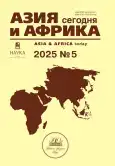SADC-led Peace Operations: Successes, Challenges, and Future Prospects
- Авторлар: Chimuka S.1, Bokeriya S.A1
-
Мекемелер:
- Peoples’ Friendship University of Russia named after Patrice Lumumba
- Шығарылым: № 5 (2025)
- Беттер: 38-44
- Бөлім: Africa day – May 25
- URL: https://journal-vniispk.ru/0321-5075/article/view/292724
- DOI: https://doi.org/10.31857/S0321507525050044
- ID: 292724
Дәйексөз келтіру
Аннотация
Peacekeeping operations led by the Southern African Development Community (SADC) have played a pivotal role in promoting stability and resolving regional conflicts in Southern Africa. This article aims to explore both the successes and challenges encountered by SADC in its peacekeeping efforts. It examines key peacekeeping operations, such as those in Lesotho, Madagascar, the Democratic Republic of Congo, Zimbabwe, and Mozambique, highlighting the significant achievements made in conflict resolution and political stabilization. The article identifies crucial factors contributing to SADC’s successes, including strong regional cooperation, diplomatic mediation, and the fostering of consensus among member states. However, it also addresses the ongoing challenges faced by SADC, particularly resource limitations, political complexities, and the evolving nature of security threats such as terrorism and insurgencies. By applying a situation-structural approach and analyzing these factors, authors provide valuable insights into the operational dynamics of SADC-led peacekeeping missions and suggest strategies for strengthening the organization’s capacity to address emerging regional security challenges. The discussion emphasizes the need for institutional reforms, improved logistics, and enhanced international partnerships to improve the effectiveness of peacekeeping operations. Ultimately, the article aims to offer a comprehensive understanding of the regional organization’s peacekeeping role and its contribution to the long-term peace and stability of Southern Africa.
Негізгі сөздер
Авторлар туралы
S. Chimuka
Peoples’ Friendship University of Russia named after Patrice Lumumba
Хат алмасуға жауапты Автор.
Email: Jonathanial@yahoo.com
ORCID iD: 0000-0002-0812-9234
Moscow, Russia
S. Bokeriya
Peoples’ Friendship University of Russia named after Patrice Lumumba
Email: bokeria_sa@pfur.ru
ORCID iD: 0000-0002-9052-4363
Moscow, Russia
Әдебиет тізімі
- Coleman K.P. Peace enforcement through sub-regional organisations: the Southern African Development Community and Operation Boleas in Lesotho. Cambridge: Cambridge University Press eBooks, 2007. Pp. 160–193.
- Schoeman M., Muller, M. Southern African Development Community as Regional Peacekeeper: Myth or Reality? African Security. 2009. Vol. 2. № 2–3. Pp. 175–192.
- Bamidele O. The challenges of peacekeeping in Africa: a revisit. Strategic Review for Southern Africa. 2020. Vol. 35. № 2. P. 22.
- Vhumbunu C.H. Appraising the efficacy of SADC in resolving the 2014 Lesotho conflict: Progress and prospects. Conflict Trends. 2015. № 3. Pp. 3–11.
- Phiri M.J.B. The Southern African Development Community (SADC) and Conflict Response in Madagascar. In: Routledge Handbook of Conflict Response and Leadership in Africa. Routledge, 2021. Pp. 143–156.
- Kotzé D. The Issue of Implementation Enforcement: SADC’s Power Mediation in Madagascar. Politeia. 2019. Vol. 38. № 1. P. 24.
- Raftopoulos B. The 2013 Elections in Zimbabwe: The End of an Era. Journal of Southern African Studies. 2013. Vol. 39. № 4. Pp. 971–988.
- Entzsch C.J. Opportunities and challenges to financing African Union peace operations. African Conflict and Peacebuilding Review. 2014. Vol. 4. № 2. Pp. 86–177.
- Bokeriya S.A., Khudaykulova A.V. UN Peacekeeping in Africa: Nature, Scope and Development. Vestnik RUDN. International Relations. 2023. Vol. 23. № 3. Pp. 435–450.
- Kgosi S.I. Could SADC’s Institutional Framework and Instruments for Peacekeeping have been Effective in Preventing the Insurgency in Northern Mozambique? African Journal of Terrorism and Insurgency Research. 2021. Vol. 2. № 2. P. 37.
- Jancic D. Regional parliaments and African economic integration. European Journal of International Law. 2019. Vol. 30. № 1. Pp. 199–228.
- Nasu H. Institutional Evolution in Africa and the ‘Peacekeeping Institution.’ In: Legal Perspectives on Security Institutions. Cambridge: Cambridge University Press, 2015. Pp. 167–189.
- Malebang G. Peace building and security policy in Southern Africa: the case of the Southern African Development Community (SADC). Journal of Human Security Studies. 2012. Vol. 1. № 6. Pp. 50–68.
- Hartmann H. The evolving mediation capacity of the Southern African Development Community. Conflict Trends. 2013. Vol. 2. № 1. Pp. 3–10.
- Honorato F.A., Jeche V.R. The complexity of the DRC conflict: Analyzing the whole of M23 and neighboring countries in the current Congo instability. Working Papers Collection. 2023. Vol. 5. P. 2.
- Pherudi M. Reflections on SAMIM withdrawal from Cabo Delgado: Reasons and implications. Global Change, Peace & Security. 2023. Vol. 35. № 2. Pp. 147–159.
- Omotola J.S. SADC and peacebuilding in the Southern African region. In: Supranational Institutions and Peacebuilding in Africa. Routledge, 2024. Pp. 171–186.
- Mutanda D. The art of mediation in resolving African conflicts: lessons for Zimbabwe and Africa. Journal of Aggression, Conflict and Peace Research. 2013. Vol. 5. № 3. Pp. 130–146.
- Ramontja N., Akinola A.O. SADC Peacekeeping Missions and the Quest for Regional Security: From Congo to Mozambique. In: Development and Regional Stability in Africa: Unlocking Potential. Cham: Springer Nature Switzerland, 2024. Pp. 131–151.
- Bokeriya S. The UN-AU Partnership in Peacekeeping: Tendencies and Problems. International Organisations Research Journal. 2022. Vol. 17. № 2. Pp. 189–207. doi: 10.17323/1996-7845-2022-02-08
- Majinge C.R. The future of peacekeeping in Africa and the normative role of the African Union. Goettingen J. Int’l L. 2010. Vol. 2. P. 463.
- Vhangani T.J., Molapo R.R. The role of the SADC in a peacekeeping mission: a case study of South Africa in the Lesotho conflict. Commonwealth Youth and Development. 2017. Vol. 15. № 2. P. 14.
- Moshoeshoe M.L., Dzinesa G.A. More Democracy, More Security? Regionalism and Political [in] Security in East and Southern Africa. Global Society. 2024. Pp. 1–26.
Қосымша файлдар










